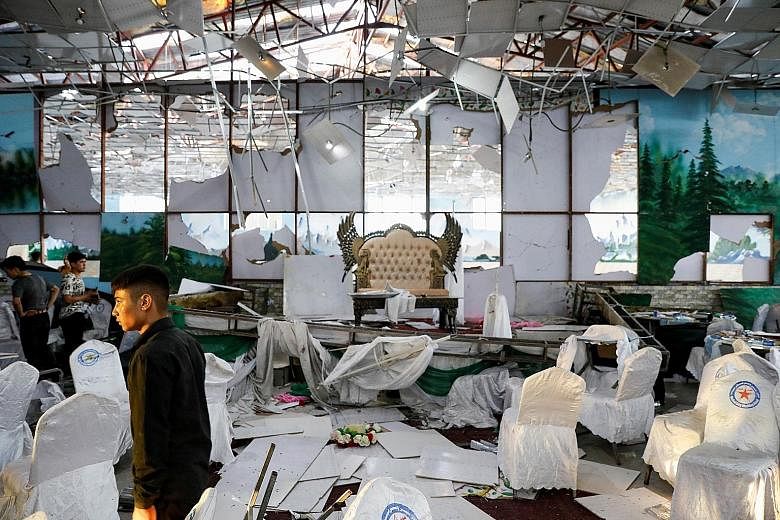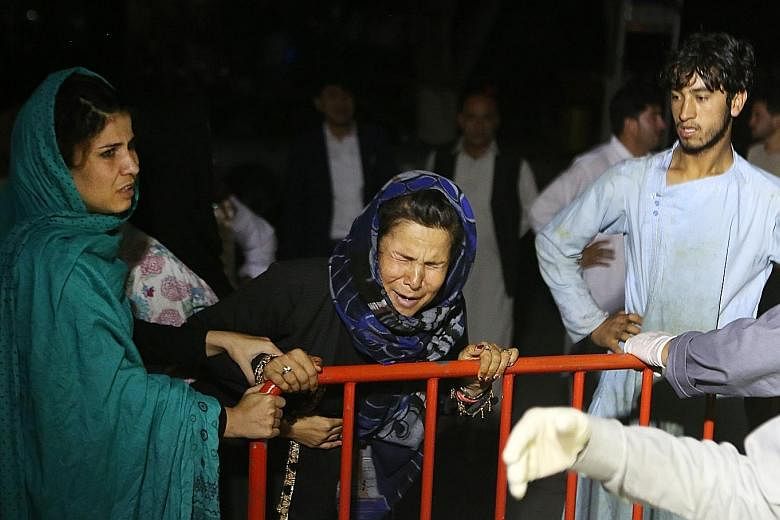KABUL • The Islamic State in Iraq and Syria (ISIS) militant group yesterday claimed responsibility for a suicide blast at a wedding reception in Afghanistan that killed 63 people, underling the dangers the country faces even if the Taleban agree to a pact with the United States.
The blast in west Kabul late last Saturday came as Washington and the Taleban were finalising a deal to reduce the US military presence in Afghanistan and hopefully build a road map to a ceasefire.
ISIS fighters, who first appeared in Afghanistan in 2014 and have since made inroads in the country's east and north, are not involved in the talks. They are battling government and US-led international forces and the Taleban.
The group, in a statement on the messaging website Telegram, claimed responsibility for the attack at a wedding hall, in a minority Shi'ite neighbourhood, saying its bomber had been able to infiltrate the reception and detonate his explosives in the crowd of "infidels".
The Taleban had earlier denied responsibility for the attack and condemned it.
The bridegroom, who gave his name as Mr Mirwais, recalled greeting smiling guests in the afternoon, before seeing their bodies being carried out hours later.
The attack "changed my happiness to sorrow", he told local TV station Tolo News. "My family, my bride are in shock, they cannot even speak. My bride keeps fainting," he said.
"I lost my brother, I lost my friends, I lost my relatives. I will never see happiness in my life again."
Interior Ministry spokesman Nasrat Rahimi said more than 180 people were injured.
"Among the wounded are women and children," Mr Rahimi said. Earlier, he stated that the blast was caused by a suicide bomber.
Afghan weddings are vibrant affairs, with hundreds or often thousands of guests celebrating for hours inside industrial-scale wedding halls.
"The wedding guests were dancing and celebrating when the blast happened," recounted Mr Munir Ahmad, 23, who was injured and whose cousin was among the dead.
"Following the explosion, there was total chaos. Everyone was screaming and crying for their loved ones," he said from his bed in a local hospital, where he was being treated for shrapnel wounds.
In the aftermath of the bombing, images from inside the hall showed blood-stained bodies on the ground along with pieces of flesh and torn clothes, hats, sandals and bottles of mineral water.
Shi'ite Muslims are often the targets of attacks in Sunni-majority Afghanistan, particularly by ISIS.
Wedding guest Mohammad Farhag said he was in the women's section when he heard a huge blast in the men's area.
"Everyone ran outside shouting and crying," he said. "For about 20 minutes, the hall was full of smoke. Almost everyone in the men's section is either dead or wounded."
The attack sent a wave of grief through a city grimly accustomed to atrocities.
President Ashraf Ghani called the incident a "barbaric attack", while Afghanistan's Chief Executive Abdullah Abdullah described it as a "crime against humanity".
The attack underscores both the inadequacy of Afghanistan's security forces and the scale of the problem they face.
While the police and army claim they prevent most bombings from happening, the fact remains that insurgents pull off horrific attacks with chilling regularity.
On July 28, at least 20 people were killed when attackers targeted Mr Ghani's running mate Amrullah Saleh on the first official day of campaigning in the presidential elections.
The incident showed how even amid tight security and known threats, insurgents can conduct brazen attacks.
The issue also goes to the heart of a prospective deal between the United States and the Taleban that would see the US begin to draw down its troop presence.
Expectations are rising for a deal in which the US would start pulling its approximately 14,000 soldiers out from Afghanistan, but few believe it will bring quick peace to the country.
The agreement relies on the Taleban providing guarantees that they will stop militant groups, such as Al-Qaeda and ISIS, from using Afghanistan as a safe haven. However, last Saturday's attack suggests that any such promise would be tough to keep.
The "Taleban cannot absolve themselves of blame, for they provide a platform for terrorists", Mr Ghani said.
AGENCE FRANCE-PRESSE


